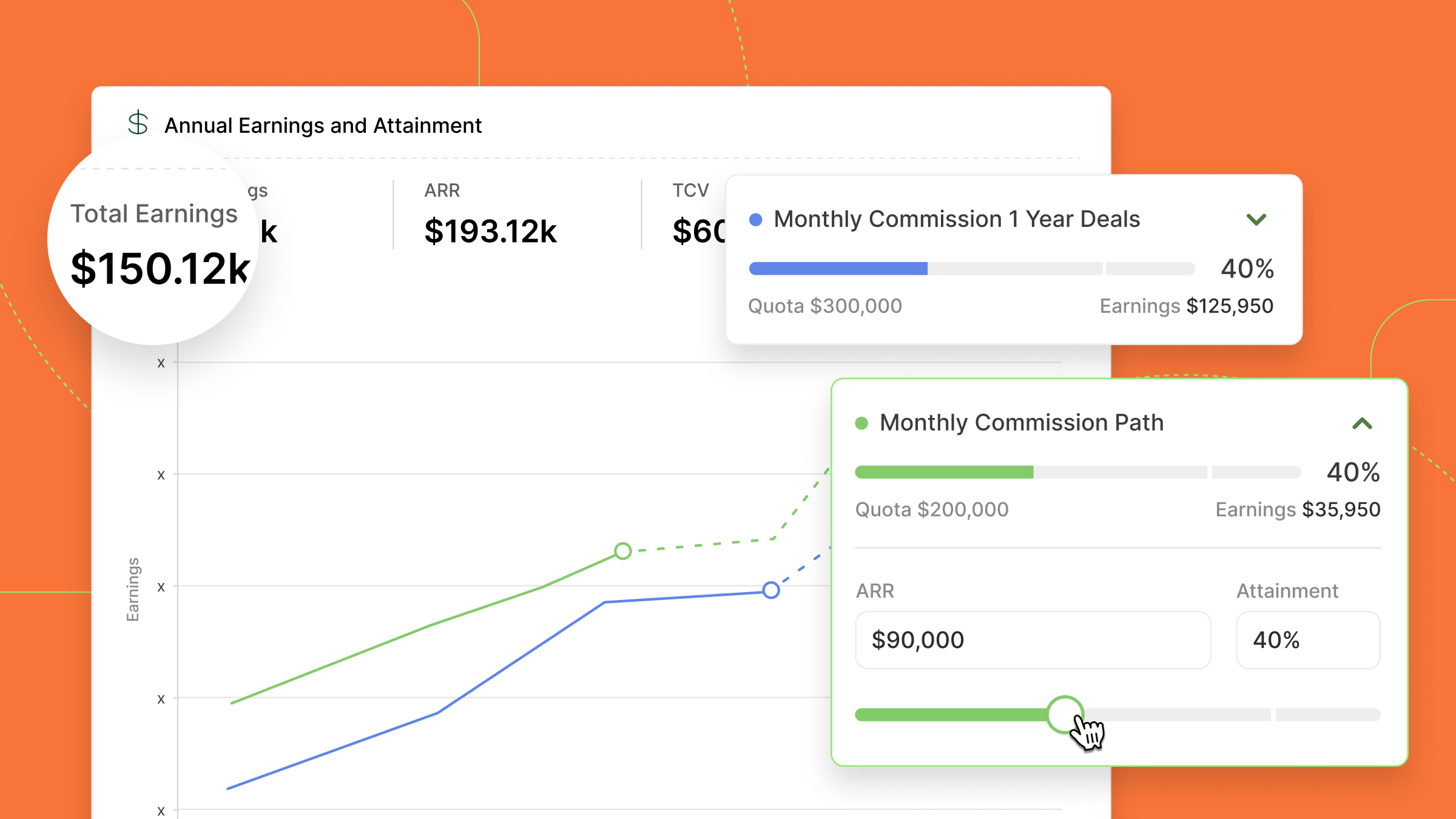Byron Sierra-Mattos has worked in sales for nearly a decade. For the past five, he’s worked in tech. Simply put, he’s seen his fair share of scaling sales team challenges.
For instance, as a rep on Apollo.io’s sales team of two, Byron averaged nine to 14 demos a day.
This pace continued for several months and peaked after Byron completed 21 demos in a single day. That’s about 15 to 18 demos too many.
No longer could Apollo’s mighty team of two handle the massive spikes in prospects. Time to scale their sales team.
Try the most collaborative solution to manage, track and payout variable compensation. Calculate commissions and pay your team accurately, and on time.
Start Trial“We started hiring like crazy,” Byron said.
Apollo had two options at this point. The hiring teams could rush to fill the seats as fast as possible. Or, they could carefully curate a team and put systems in place to find the right people fast and help them flourish.
Fortunately for Byron, leadership chose the latter.
“They were really strategic about hiring,” said Byron, who now supports Apollo’s account management team as a lead. “It took about four to six months to scale, but we used that time to build a playbook, processes and invest heavily in training.”
Byron’s experience marked a nice change-up from that at his previous employer, where he said the company “burned and churned” through new hire cycles.
Qualia’s VP of Sales Brandon Calley shared similar sentiments and stressed the importance of building out a new hire profile. This allows for leaders to quickly identify candidates who will add to the health of the team both culturally and performance-wise.
“To overcome the challenges around scaling a sales team, dial in on the profile of people you’re looking to hire,” Brandon said. “Find people who have proven track records of success, who have certain intangible qualities like curiosity, drive, high aptitude to learn new things, and who are adaptable.”
We spoke with Byron and Brandon to learn what other scaling sales team challenges they’ve faced. To see how they’ve overcome potential risks from an executive lens and a senior individual contributor’s perspective, read on.
Meet our guests
Prior to joining Apollo, a sales platform that streamlines prospecting efforts, Byron Sierra-Mattos worked at SnackNation, where he ranked as the No.2 top-selling rep for 22 months consecutively. His experience mentoring and supporting new reps runs deep. At SnackNation, he helped onboard new hires as his team doubled from 30 to 60 reps. Now at Apollo, he continues to play a role in the hiring and training processes. Since he started there, his team has scaled from two to 29, with more reps on the way. In November, Apollo promoted Byron to team lead and senior account manager.
Brandon Calley’s experience scaling sales teams dates back to the early 2000s when he served as sales manager for an online marketing startup. Since then, Brandon has developed and led high-growth teams at Meltwater, Reputation.com, Upwork, MongoDB, Vacasa, and now Qualia. Since joining Qualia in 2019, Brandon has scaled his sales team from 30 reps to 70.
Challenge No. 1: Hiring the right people
“Everyone has an idea of the profile for a successful seller, but that can vary from product to product,” Brandon said.
This idea also varies between different sales motions, which are the methods an organization practices to deliver a product or service.
“A complex platform with a longer sales cycle, for example, requires someone who is patient, detail-oriented, and adaptable,” Brandon said.
Whereas a shorter sales cycle with a higher velocity of sales often requires someone who can hold a strong position and is firm in communication.
Solution: Draw up exactly who you need
Just like sales organizations hone in on their ideal customer personas, leaders should also create their ideal sales hire profile.
“This is particularly important right now because it’s hard to hire account executives,” Brandon said. “Dial in on who you are looking for.”
Once identified, sales leaders should then actively recruit them while personalizing their message.
“You cannot use templated messaging,” Brandon said. “You need a differentiator to attract candidates and show them why this opportunity is different from the other 15 they are being approached for.”
Challenge No. 2: Ramping new hires
You’ve got the offer letters signed. Now what? One of the biggest challenges scaling sales teams face — outside of hiring — is reducing the time it takes for a new hire to turn productive. Meaning, they can now hit a full quota on their own.
“At most companies, this is going to be a mix of effective industry training, product training, sales execution motion practice, and the effort they put in,” Brandon said.
This industry training should evolve over time, but you have to start somewhere. Brandon suggests including real-life application of the job within a sales boot camp and having reps earn certifications along the way. Examples could entail certifications for executing a prospecting deal or running a full demo independently.
Solution: Establish a scoring system
“The best way to check this is to set a knowledge score on a matrix,” Brandon said. “What is the ideal knowledge score that demonstrates a requisite level of knowledge to be successful? What does the application look like?”
He recommends tracking activities and measuring through a tool like Gong. Sales coaches, too, should conduct live observations to see if new reps can apply knowledge correctly.
Challenge No. 3: New sales leadership
When sales teams scale, news leadership often follows. If someone comes into the organization externally as a manager, director, or VP, a disconnect between the existing team and new management can occur.
In this instance, Byron recommends looping in your senior reps for intel and assistance.
Solution: Leverage your senior reps
Your senior reps can be the gateway to understanding the existing team culture, performance, and coaching opportunities.
“I’m shocked whenever new managers come in and don’t put in the effort to get to know their senior reps,” Byron said. “How are you supposed to teach someone something new that you’ve never done yourself? Or that you haven’t spent time with the people who really know it?”
Lean on those who have been there and want to help.
“We have pretty good ideas!” Byron said, who initiated and led team-wide training every two weeks for Apollo’s sales team.
Challenge No. 4: Process buy-in
The team has spent months piecing together an onboarding and training process. But is it being adopted?
“A challenge that comes up while scaling a sales team is in process execution,” Brandon said. “Are people following the process that they’ve been trained on? Are managers coaching to that process? Is everyone executing this at the same time?”
If you’ve answered “no” to any of these questions, your scaling efforts are at risk.
Solution: Document, train, and add technology
“Make sure to document the entire sales process,” Brandon said. “People need to be trained on it and be able to go back and reference it.”
At Qualia, for instance, Bradon’s leadership team built out a clear document playbook that outlines the entire enterprise presale process and scripted sales motion.
“As a new hire, if you come in, go through our ramp training, and follow the script, you’ll be semi-successful here before even fully understanding the content,” Brandon said.
Then, to ensure that the team keeps swimming together in the same direction, provide sales enablement resources that offer ongoing training for all levels of the sales team.
An elegant process design that includes sales technology that helps teams scale, goes a long way, too.
Challenge No. 5: Meaningful mentorship
As your team grows, you may start pairing new hires with more tenured reps for support. One thing to keep in mind, however, is that mentorship programs are most effective when both the mentee and the mentor benefit. We often package the opportunity to mentor someone as a great opportunity, but give them more than lip service. Design them in a way that directly benefits mentees and mentors.
“As an individual contributor, I’ve always been willing to help without getting paid, but I will give my mentee a lot more attention if I can get something out of it as well,” Byron said.
Solution: Incentivize mentors
“At Apollo we have a buddy system,” Byron said. “I’ll shadow sales calls with my buddy and provide feedback and coaching opportunities.”
Then, as his buddies hit their ramp quota, Byron might earn a percentage of their total deals or a one-time bonus.
Design, track, and manage variable incentives with QuotaPath. Give your RevOps, finance, and sales teams transparency into sales compensation.
Talk to SalesGoodbye scaling sales team challenges
We hope you’ve learned some practices to overcome common challenges sales teams face as they scale. We certainly did. Thank you to Brandon and Byron for sharing their insights with us.
If your sales team has hiring plans next year, please continue to lean on us as a resource for intel and technology. Our compensation management platform makes it easy to add new teams and comp plans while tracking and forecasting quota attainments. We’ll even automate commission payouts for you. Plus, our leaders regularly host webinars and appear as guest speakers within the industry that we share on LinkedIn and Twitter.



